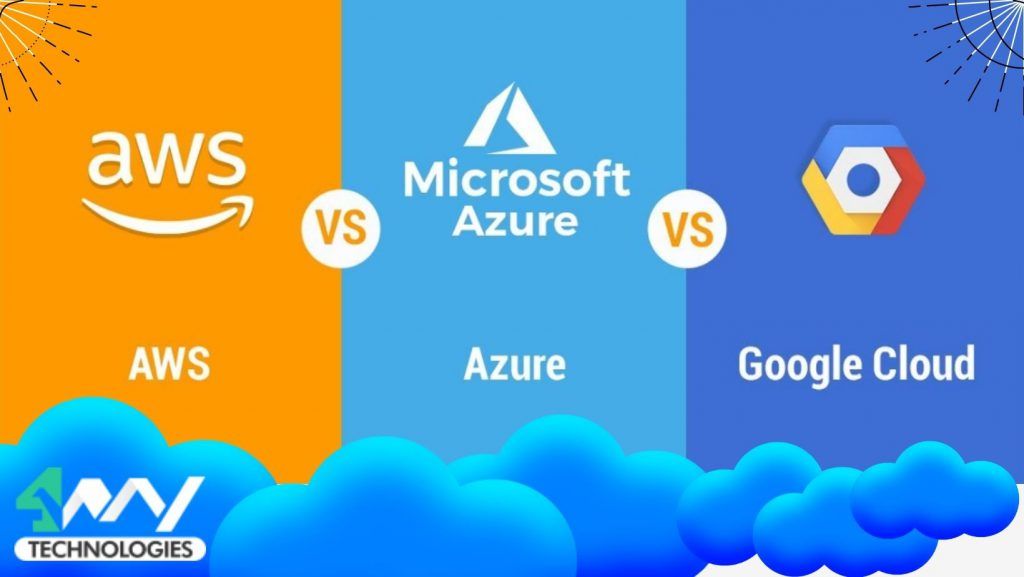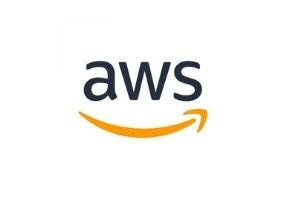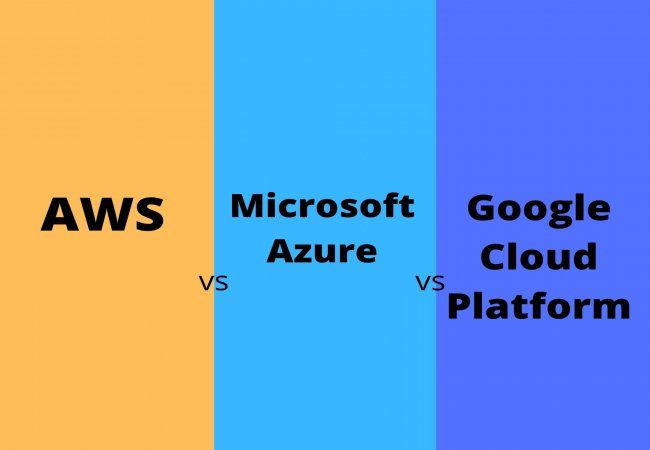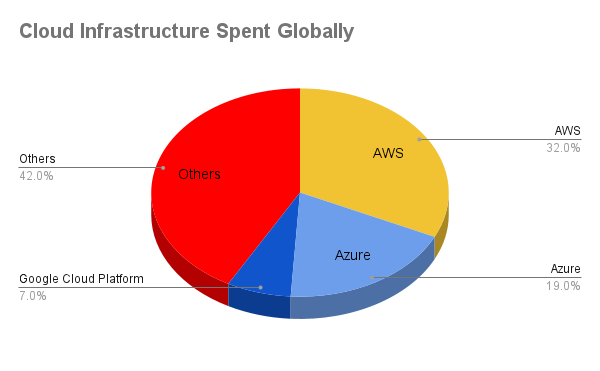AWS vs Azure vs GCP

Cloud computing platforms have become one of the most preferable data storage solutions for several organizations as it eradicates the cost of managing and owning on-premise data centers. Cloud services are safe, reliable, and flexible.
Also, cloud providers offer on-demand computing resources and services in the cloud with pay-as-you-go pricing that helps organizations in saving money, which is why cloud migration services are increasing at a fast pace.
This article will provide you with an introduction to the big three cloud providers; Amazon Web Services (AWS), Microsoft Azure, and Google Cloud Platform (GCP) and will also help you in understanding the differences between them.
What is AWS?

Amazon Web Services (AWS) is one of the most widely adopted cloud platforms that offer more than 250 services from a large number of data centers across the globe. AWS launched its cloud computing services in March 2006 offering on-demand APIs and cloud computing platforms to governments, companies, and individual developers on a pay-as-you-go basis.
AWS managed services help companies in scaling, moving at a fast pace, and lowering the costs of IT infrastructure by providing the basic technical infrastructure, building blocks, and development tools for mobile app development and web app development.
Pros of AWS
- AWS migration allows you to access the cloud with unlimited capacity.
- You need to pay only for the AWS managed services that you use without any long-term commitments.
- AWS also offers familiar architectures, programming models, databases, and operating systems to the companies.
- Your application will be deployed in several regions across the world with the help of a few clicks.
- As compared to any other cloud-providing platform, AWS managed services offer a low Total Cost of Ownership (TOC).
Cons of AWS
- In case you need more immediate assistance, you have to pay for support packages.
- Amazon Web Services set default limits on snapshots, images, and volumes, which may differ from region to region.
What is Microsoft Azure?

Microsoft Azure is a cloud computing service, which is a close competitor to Amazon Web Services with an impeccable cloud infrastructure. Azure was launched by Microsoft in February 2010 as Windows Azure and renamed Microsoft Azure in March 2014.
Azure is a cloud provider service that allows you to build, test, deploy, and manage services and applications through Microsoft-managed data centers. Azure also supports many different frameworks, development tools, and programming languages in order to develop applications as per your need.
Azure managed services include a large number of cloud services and products that have been designed in order to help you in bringing new and innovative ways to manage and run mobile and web applications with the frameworks and other development tools of your choice.
Pros of Microsoft Azure
- Microsoft Azure managed services offer enhanced scalability and better sustainability as it allows you to easily scale the computing power down or up in a few clicks.
- Azure managed services strongly emphasize security and follow the standard security model; Detect, Assess, Diagnose, Stabilize, and Close. Azure possesses strong cybersecurity controls due to which Azure managed services have achieved several compliance certifications.
- Microsoft Azure includes several industry-specific applications in order to address the unique needs of certain industries because of their sensitive nature such as financial services, manufacturing services, health care, and more.
Cons of Microsoft Azure
- Microsoft Azure does not help you in managing your cloud-based data centre. Instead, you need to have good knowledge of server monitoring and software patching in order to manage your data efficiently.
- Many organizations complain about the Azure Fast Start (AFS) program, which provides inconsistent solutions that are not needed by the organizations.
What is Google Cloud Platform?

Google Cloud Platform (GCP) was launched in April 2008, which is a cloud computing platform that offers several public cloud computing services offered by Google. Google cloud managed services include a wide variety of hosted services for data storage, compute, machine learning, and application development, which run on the hardware provided by Google.
Google Cloud Platform is an attractive alternative to various cloud providers such as Microsoft Azure, Amazon Web Services, Digital Ocean, and more. GCP offers you an intuitive interface, flexible compute options, and lower pricing. Google cloud managed services are way ahead of AWS managed services and Azure managed services when it comes to payment configurability, traffic security, and machine learning. Google Cloud Platform is highly efficient in offering big data analytics along with considerable scale and load balancing.
Pros of Google Cloud Platform
GCP offers better pricing as compared to its close competitors; Amazon Web Services and Microsoft Azure.
- Google Cloud Platform possesses one of the best and tiered networks across the world as compared to some of the most widely used cloud computing platforms.
- Another best functionality offered by Google cloud managed services is live migration of virtual machines, which you may not experience in Azure, AWS, or any other cloud service providers. Google Cloud allows developers to address issues such as repairing, patching, updating hardware or software in a better way.
- GCP supports several databases such as Oracle, MYSQL, Sam, SQL, and more.
Cons of Google Cloud Platform
- As compared to AWS and Azure, GCP has fewer data centres globally, however, they are expanding quickly.
- GCP does not include an innovative range of functions as compared to AWS or Azure.
Comparing AWS, Microsoft Azure, and GCP

AWS Compute Services
- Amazon Elastic Compute Cloud (EC2)
Amazon EC2 is a simple web service interface that enables you to securely compute in the cloud. It is a virtual computing environment, which is designed for developers in order to make web-scale computing more easy and resizable.
Amazon EC2 provides you with an excellent computing platform with the type of storage, processors, operating systems, networking, and purchase model of your choice. There are various instances provided by Amazon EC2 in order to build intuitive and scalable applications such as General Purpose, Compute Optimized, Memory Optimized, Accelerated Computing, and Storage Optimized instances.
- AWS Elastic Beanstalk
AWS Elastic Beanstalk is a simple service that allows you to scale and deploy web and mobile applications developed with Python, Java, PHP, .NET, and more on familiar servers like IIS, Apache, etc. AWS Elastic Beanstalk simply requires you to upload the code and it automatically handles the deployment whether it is capacity provisioning, auto-scaling, or load balancing.
Azure Compute Services
- Virtual Machines
The primary cloud compute service provided by Microsoft Azure is known as Virtual Machines. It is no different from any physical computer and includes a large number of available instances, GPUs, and high-performance computing options. It also possesses instances optimized for machine learning and Artificial Intelligence (AI). Virtual Machine boasts support for Windows Server, Oracle, Linux, SQL Server, along with hybrid capabilities, enhanced security, and integrated support for Microsoft Software.
- Azure Kubernetes Service (AKS)
Azure Kubernetes Service is used most frequently by web app and mobile app developers since it became available in June 2018. AKS is a fully managed serverless Kubernetes service that allows you to manage and deploy containerized applications with ease. It also offers high-grade security and an integrated Continous Integration and Continous Delivery (CI/CD) experience to the developers.
Read also:-How to Develop a Real Estate Application Like Zillow and Trulia?
GCP Compute Services
- Google Compute Engine (GCE)
Google Compute Engine is a customizable hosting and computing service offered by Google Cloud Platform, which allows you to create and run virtual machines on an infrastructure provided by Google. Compute Engine easily allows you to launch highly scalable, efficient, and large compute clusters on Google’s infrastructures.
- Google Kubernetes Engine (GKE)
Google Kubernetes Engine is a cloud-based Kubernetes service offered by GCP that offers a managed environment to the developers in order to manage, scale, and deploy the containerized applications using the infrastructure provided by Google. The environment of GKE includes multiple Compute Engine instances, which are grouped together in order to form a cloud compute cluster.
So, if you want to choose the best cloud provider among AWS, Azure, and GCP when it comes to compute services, clearly AWS wins the battle with offering more than 250+ services. On the other hand, Microsoft Azure offers 100+ services whereas GCP offers 60+ services. However, Azure and GCP both are dedicated to the continuity of their expansion.
Read Also:-https://4waytechnologies.com/blog/how-beacon-based-proximity-marketing-works/
AWS vs Azure vs GCP Storage and Database Services Comparison
- Amazon Simple Storage Service (S3)
AWS offers Simple Storage Service (S3), which is an object storage service that provides enhanced security, data availability, impeccable scalability, and performance. S3 allows all the developers and organizations to store and protect enormous amounts of data for mobile applications, websites, data analytics, and more. One of the major features of S3 is that it can automatically create and store copies of all the S3 objects across various systems, which is why S3 possesses 99.999999999% of data durability.
- Relational Database Service (RDS)
Amazon Relational Database Service offers you an easy setup, operation, and scaling of a relational database in the cloud. RDS automatically processes time-consuming tasks like database setup, software patching, hardware provisioning, and backups in order to provide you resizable and cost-efficient compute capacity.
Azure Storage and Database Services
- Blob Storage
Azure Blob Storage is a highly secure and scalable object storage service for data lakes, cloud-native workloads, machine learning, and efficient computing. Blob Storage allows you to create data lakes for your project requirements and offer storage in order to develop cloud-native powerful mobile applications.
- SQL Database
Azure SQL Database is a scalable, intelligent, relational database service designed for the Azure cloud. It offers you well managed and intelligent SQL database in the cloud for developing more scalable applications. Azure SQL Database consists of updated automated, AI-powered features that deliver enhanced durability and performance.
GCP Storage and Database Services
- Google Cloud Storage
Google Cloud Storage is an online file storage web service that allows you to access and store data on Google Cloud Platform infrastructure. Google Cloud Storage service features the combination of scalability and performance provided by Google’s cloud with sharing capabilities and advanced security. It is an object storage service that also allows you to store unlimited data with no minimum object size.
- Google Cloud SQL
Google Cloud SQL is a fully-managed relational database service that provides you with the flexibility in order to set up database infrastructure after cloud application development. It also allows you to conveniently shift the existing databases running in SQL Server, MYSQL, or PostgreSQL BETA. It also ensures business continuity with secure and reliable services supervised and backed by a 24/7 SRE team.
After going through the storage and database services provided by Amazon Web Services, Microsoft Azure, and Google Cloud Platform, it is obvious that Amazon Simple Storage Service (S3) and Amazon RDS are better with tried and tested technology, extensive documentation, and large community support. However, Azure and GCP on the other hand, also provide reliable and secure storage services, but AWS is a clear winner when it comes to storage services.
AWS Networking Service
- Amazon Virtual Private Cloud (VPC)
Amazon Virtual Private Cloud is a networking service offered by AWS that allows you to launch AWS resources in a logically isolated virtual network defined by you. Amazon VPC gives you complete control over the virtual networking environment, which includes an IP address range of your own choice, the configuration of route tables, creation of subnets, and network gateways. VPC allows you to use both IPv4 and IPv6 for most of the resources in order to ensure easy and secure access to the applications.
Azure Networking Service
- Azure Virtual Network (VNet)
Azure Virtual Network is a virtual networking service offered by Microsoft Azure, which is the fundamental building block for your private network. VNet enables various Azure resources like Azure Virtual Machines to communicate with each other securely, the on-premise networks, and the internet.
GCP Networking Service
- Virtual Private Cloud (VPC)
A Virtual Private Cloud network is a virtual networking service offered by Google Cloud that provides connectivity for the Compute Engine virtual machine instances like GKE
and other Google Cloud products created on Compute Engine VMs. One of the main features of Google VPC is that it can connect to on-premise networks with the help of Cloud interconnect attachments and Cloud VPN tunnels.
When it comes to networking services provided by AWS, Azure, and GCP, AWS is again way ahead of Azure and GCP with 213 edge locations in 90 cities across 47 countries. However, Microsoft Azure also has 116 edge locations across 100 metro cities and GCP has 146 Points-of-Presence (POP) across 61 metro cities.
So, when we talk about price comparison between AWS, Azure, and GCP, Google Cloud Platform wins this three-way battle here as Google Cloud also offers pay-per-second models, which allows you to save more than using Azure or AWS. Also, GCP offers deep discounts up to 50% in some exceptional cases as compared to AWS or Azure.
Read Also:-https://4waytechnologies.com/blog/5-myths-about-mobile-app-development/
AWS vs Azure vs GCP Market Shares and Growth Rate Comparison
AWS vs Azure vs GCP Growth Rate Comparison

According to the reports of April 2021, the growth of the global Cloud market in this quarter has been reported up to 35% with a revenue generation of US$ 41.8 billion. Since AWS is the oldest in the Cloud market, it holds 32% of the total market share followed by Azure that holds 19% market shares, and GCP that holds 7% of the market shares. So, clearly, AWS is again a winner among Azure and GCP when it comes to market shares.
Conclusion
After going through the features, advantages, and disadvantages of Azure, AWS, and GCP cloud providers, we can say that surely all of these cloud providers are unique in their own ways and offer a variety of features and functionality to the developers. However, AWS managed services can be announced as a winner because of being the earliest cloud computing platform. But Google Cloud Platform and Microsoft Azure, both are close competitions and can equally likely serve the purpose for you. As being a mobile app developer you can choose better which one suits you as per the need and requirements of your project.
Blog You Might Be Interested In:-
Top DevOps Mistakes Everyone Makes While Implementing
How To Design and Develop Android TV App [ 2022 Tutorial ]

4 Way Technologies is a premium IT services company that develops web, mobile, and SMART TV applications using cutting-edge technologies like React, Node.JS, Deno, Go lang, AWS, and AEM. We establish our thought leadership by sharing content and insights around technology.